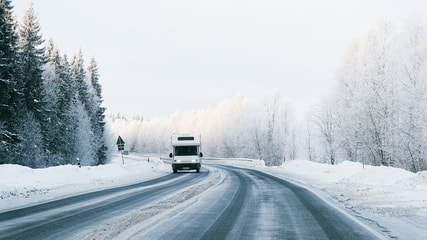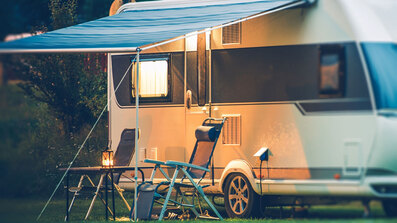Harris, Reed & Seiferth
|
 I apologize if you're holding on to your last days of warmth, but winter will be here before you know it! If you travel year-round in an RV and are looking forward to camping in snowy weather, be prepared for poor road conditions. Here are three tips to keep you, your family, and your RV safe during wintertime travel:
Source: https://www.foremost.com/learning-center/three-tips-for-driving-your-RV-in-the-snow.asp
0 Comments
 Transitioning from a home where you have roots in one place to a full-time life on the road is a drastic change, but there are many things that draw people to this “nomad” lifestyle. It could be the flexibility, the love of traveling, or maybe you just want to get out of your comfort zone and try something new! Whatever the reason may be, if you’re preparing to be an RV full-timer, kudos for having the courage to embrace this exciting lifestyle change. We know it can be overwhelming to think about the details involved with living full-time in an RV, and your choice to welcome the open road may seem impulsive to others, but that’s okay. Life is short, and who knows … you may end up regretting not doing this sooner! Here are some tips to help you prepare for living in an RV full-time. Become a Minimalist. Adapting a minimalist lifestyle often requires major changes. You’re probably going from a normal-sized home to a roughly 270 square foot space, which forces you to ask: “What do I really need?” To determine this, start by writing down everything you want to bring, then write another list of everything you actually need. This will help you visualize and prioritize your possessions. Bring all the necessities, of course – clothes, toiletries, shoes, cookware, etc. However, you won’t nee d 10 pairs of boots, or the many t-shirts that have been sitting in your drawers for 2+ years, or 20 drinking glasses that you currently have in your kitchen. You may need to make some tough decisions, but take this opportunity to de-clutter your belongings. Make a “take” pile and a “donation” pile. It’s always a good idea, even if you aren’t planning to RV full-time! Go Paperless. Life on the road means you won’t be home to pick up your mail and see if you received any bills. Move all of your bills (cell phone, medical, credit cards, auto insurance, etc.) to automated billing so you don’t need to worry about it. Once you make the switch, you should get all notifications for your bills via email moving forward. Plus, this helps save the environment! Sell or Keep Your Home? This brings us to our next question – will you make the commitment to sell your home and have your RV be your only residence? This depends on how much you plan to travel throughout the year. Also, can you afford to keep your home while traveling? You will still have your mortgage payments, maintenance on the home and other obligations. If you decide to keep your home, there’s always the option of renting it out so you won’t have to worry about any mortgage payments. If you don’t start renting, make sure you have someone regularly stopping by your home to get the mail and take care of any maintenance needed as the seasons go by. If you do decide to sell your home or cancel a lease, you will need to choose a domicile state and receive mail. Getting a domicile means you are choosing a state for your legal residence. This state will be listed on your driver’s license, where you purchase your health insurance, where you can vote and where you will accept mail. (There are lots of mail-forwarding services that will set you up with a street address so you can officially establish residency. This is helpful because a P.O. Box address will not be accepted as your legal residence). The best states for full-time RVer domiciles are Texas, Florida or South Dakota.* People usually choose these states because they are income tax-free! Selling your home will also allow more financial freedom for your RV travels! Get that estate sale ready, or find a storage unit to put all of your furniture in, just in case you ever want a break from the RV life. Determine a Monthly Budget. You may think you’ll be saving a lot of money when you live on the road – but you will be surprised. Since your expenses will be drastically different from when you lived in a home, you need to budget and keep track of everything you spend. Things like campsite fees, eating out frequently, gas and unexpected RV repairs can add up. Once you get a good idea of how much you’re spending each month, you can adjust your budget accordingly. Purchase Full-Time RV Insurance. Since your RV will be your permanent residence, you need a specific type of insurance coverage called “Full-Time RV Insurance.” You will be covered against liabilities, Additional Living Expenses, medical expenses in the case of an accident and more! Contact one of our local agents today to get more information on how you can get covered, so you can enjoy your travels across the U.S., or start an RV quote now! Stay Connected with Family and Friends. Communicate with your friends and family on a regular basis. (They will miss you!) It’s also a good idea to let a few people know your current location and where you’re headed next on a regular basis, just in case of an emergency. To make your loved ones feel like they’re part of your adventure, post pictures frequently on social media or send them via text or email. It will let everyone know you and your companions are safe, and also allows you to stay connected with everyone even when you’re not physically with them. Enjoy Every Minute. Living life on the road is a once-in-a-lifetime experience. You will see amazing things, meet one-of-a-kind people and make the best memories. Don’t take it for granted! With traveling, you will always run into some bumps in the road – but that’s part of the journey. Don’t let it discourage your long-term goals. You’re not tied down to a routine now, so enjoy the freedom and independence that comes with RVing full-time. Stay safe and happy travels from Foremost! Source: https://www.foremost.com/learning-center/a-guide-for-full-time-rv-living.asp
*https://www.moneycrashers.com/rv-living-choose-domicile-state-get-mail/  Anyone who's been through a flood knows that recovering after this kind of disaster isn't easy. You're forced to accept that irreplaceable family treasures and memories may be gone forever, your furniture is destroyed, potentially along with your home. It's a devastating and emotional moment and a lot to take in all at once. But you know the only thing you can do is move forward, and begin the steps needed to restore your home. As soon as the floodwaters recede, you can return to your home as long as officials give the OK to do so. Before entering your home, however, make sure it is safe! Tips for staying safe upon return:
Tips for claim reporting: Another important step to take when recovering from a flood is reporting your loss immediately to your insurance agent or carrier. While flood coverage is typically not provided under most homeowners and renters policies, flood insurance may be available to you through the federally regulated program known as the National Flood Insurance Program (NFIP). If you need assistance to locate your flood insurance carrier, you can call 1-800-621-FEMA (3362). A claims adjuster should contact you within a day or two after report of the claim, depending on the severity of the flood event. When reporting a claim, you should have the following information available:
Tips for inspections: The next step, according to the Federal Emergency Management Agency (FEMA), is to prepare for your inspection. After deeming the structure safe for entry, take as many photos or videos of the flood-damaged property on the outside and inside. Take pictures of high-cost items as well like washers and dryers, hot water heaters, televisions and kitchen appliances. It's also a good idea to separate the damaged from undamaged items prior to the inspection. When the adjuster arrives, they will inspect your property including taking measurements and photos and give you an overview of the NFIP flood claims process. Remember that some flood insurance claims are more complex than others. Some may be opened and closed quickly, while others may take weeks or even months to resolve. If your vehicle was also damaged in a flood event, it's best to call your auto insurance provider to see if you're covered for the loss. Source: https://www.foremost.com/learning-center/what-to-do-after-a-flood
|
Categories
All
Archives
May 2024
|
Social MediaContact UsNavigation |
|
Website by InsuranceSplash
Privacy Policy | Terms of Use
© 2025 by HARRIS, REED & SEIFERTH INSURANCE GROUP, INC. All rights reserved.
© 2025 by HARRIS, REED & SEIFERTH INSURANCE GROUP, INC. All rights reserved.

 RSS Feed
RSS Feed